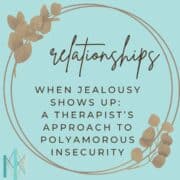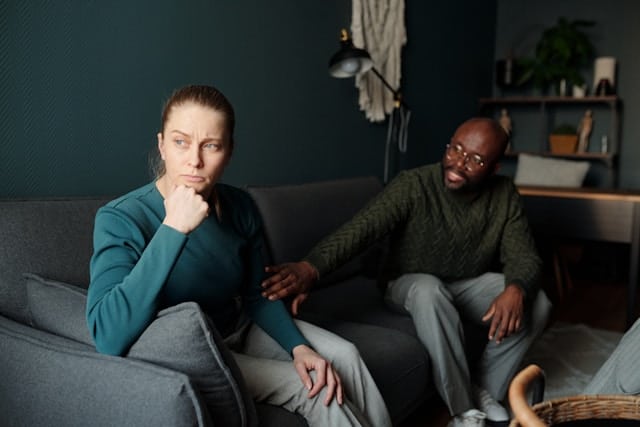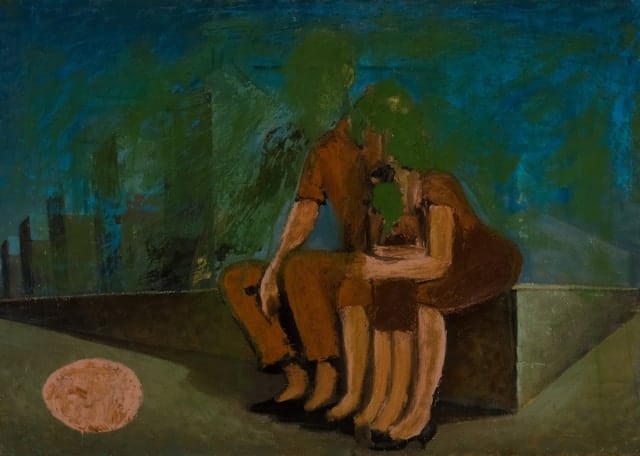
Jealousy is one of the most emotionally charged topics in relationships. It’s a word that can stir up shame, fear, defensiveness, or guilt—especially in polyamorous and non-monogamous dynamics, where freedom and trust are central values.
Many people believe that if they were truly “evolved” or “secure,” they wouldn’t feel jealous at all. But that’s not how emotions work—and it’s not how healing works.
In therapy, we take a different approach. We don’t treat jealousy as a problem to eliminate. Instead, we view it as a signal—one that can offer vital insight into your needs, boundaries, attachment wounds, or growth edges. When explored with curiosity and care, jealousy can be a doorway to deeper self-awareness, more secure connection, and more intentional relational practices.
Find a therapist who practices inclusive therapy.
What Is Jealousy, Really?

Jealousy is often lumped in with envy, but they are emotionally and relationally distinct. Envy is about wanting something someone else has. Jealousy is the fear that something important to you—especially someone—might be taken away, replaced, or given to someone else in a way that makes you feel abandoned or diminished.
In non-monogamous relationships, jealousy can be particularly layered. Here’s how it often shows up, and what each experience can mean beneath the surface:
Feeling anxious when your partner goes on a date with someone new:
This anxiety may stem from uncertainty about your role in the relationship or fear that novelty will be prioritized over stability. Underneath this can be attachment-related fears—especially for people with anxious or disorganized attachment styles.
Comparing yourself to a metamour (your partner’s partner):
You might notice thoughts like “Are they better than me?” or “What if my partner loves them more?” These comparisons are often rooted in internalized scarcity and self-worth challenges. If you grew up in environments where love or attention was conditional, this kind of comparison can feel threatening, even if it’s not based in reality.
Worrying that you’re “not enough” or will be replaced:
This fear is often linked to early relational trauma or messages about disposability. Therapy can help explore where these beliefs started and how to build an internal sense of worth that isn’t dependent on external validation.
Struggling with time-sharing, attention, or sexual intimacy:
When attention or presence feels limited, it can trigger primal fears of being forgotten or excluded. In therapy, clients often discover this is less about logistics and more about emotional connection and consistency.
Feeling left out of a special experience between others:
You may feel a sense of longing, exclusion, or grief when your partner has meaningful experiences without you. This doesn’t make you controlling—it means you’re wired for connection, and something in you is signaling a need to be seen or prioritized.
Rather than labeling jealousy as “irrational” or “immature,” inclusive therapy seeks to understand its context and compassionately hold the parts of you that feel vulnerable.
Why Do I Feel Jealous If I Chose Polyamory?
One of the most common reasons clients come to therapy is that they intellectually support polyamory but emotionally struggle with how it feels. They may ask:
- “Why does this hurt if I believe in it?”
- “Shouldn’t I be over this by now?”
- “Am I just not cut out for this?”
These questions often come from the tension between your values and your wounds. You might believe in consent, abundance, and autonomy, but still carry emotional imprints from earlier experiences that haven’t fully healed.
Here are some deeper reasons jealousy might arise—even when polyamory aligns with your values:
Fear of abandonment or being replaced:
This fear is often rooted in early attachment trauma or emotional neglect. Even if a current partner is loving and affirming, your nervous system may still anticipate being left or de-prioritized. Therapy—particularly attachment-based or somatic therapy—can help rewire your sense of emotional safety.
Internalized scarcity:
Capitalist and patriarchal systems teach us that love, care, and attention are finite. You may unconsciously believe that someone else’s gain is your loss. Therapy can help challenge this zero-sum view and cultivate trust in relational abundance.
Early experiences of feeling unwanted or invisible:
If you grew up feeling unseen, unloved, or only conditionally accepted, you may be highly sensitive to any situation that mimics exclusion. Non-monogamy, with its shifting configurations, can stir these feelings. Inner child work, especially within Gestalt or transpersonal frameworks, can support healing.
Societal conditioning:
We are inundated with stories equating love with possession and exclusivity. Even if you’ve chosen polyamory, unlearning those messages takes time. Cognitive-behavioral therapy (CBT) techniques can help uncover and replace these ingrained narratives.
Unclear agreements or unmet needs:
Sometimes jealousy isn’t about past wounds—it’s about current confusion. If your agreements with partners are vague, inconsistent, or unspoken, your nervous system may default to anxiety. Therapy can help clarify agreements and support healthier communication.
Understanding why jealousy is arising allows you to address the root, not just the surface-level feeling.
Six Therapeutic Approaches to Navigating Jealousy
Therapy offers a wide range of tools for working through jealousy with self-awareness and compassion. Here are six approaches therapists may use to support clients facing polyamorous insecurity:
1. Get Curious, Not Judgmental
Rather than labeling jealousy as bad or embarrassing, therapy invites curiosity: What part of me is afraid? What is this feeling protecting? Using mindfulness or psychodynamic inquiry, therapists help you slow down and name what’s really present. This shifts jealousy from a reaction into a relational signal that deserves attention.
2. Trace the Emotional Root with Depth-Oriented Work
Your therapist may help you track jealousy back to earlier experiences where you felt unseen, abandoned, or not chosen. In modalities like Attachment-Based Therapy or Trauma-Informed Psychotherapy, clients often uncover old wounds that are reactivated in the present. Healing these wounds doesn’t mean jealousy disappears, but it becomes less overwhelming—and less likely to dictate your behavior.
3. Develop a Compassionate Inner Dialogue
Through approaches like Compassion-Focused Therapy (CFT) or Internal Family Systems (IFS), you can learn to meet jealousy with kindness. You’ll get to know the part of you that feels threatened, the part that feels ashamed of feeling threatened, and the part that wants to be “good at polyamory.” Instead of letting one part dominate, therapy helps you hold all these voices with tenderness, allowing for internal harmony.
4. Build Relational Agreements That Support Nervous System Safety
Therapy can help partners create clear, co-created agreements around time, intimacy, communication, and check-ins. In Relational Life Therapy or Nonviolent Communication (NVC) frameworks, you’ll learn how to express needs without blame and set boundaries that support trust. Sometimes, jealousy softens not because feelings change, but because structure provides stability.
5. Learn Somatic Regulation Skills
Jealousy is not just a thought—it’s a full-body experience. In Somatic Experiencing or Mindfulness-Based Stress Reduction (MBSR), you’ll learn techniques to regulate your nervous system in moments of intensity. Breathwork, grounding, orienting, and titration can help you stay present and soothe reactivity as it arises.
6. Cultivate Secure Attachment in Chosen Relationships
Jealousy often diminishes when emotional connection is strong and consistent. In therapy, you may work on strengthening your secure attachment through emotional attunement, responsive communication, and co-regulation. This doesn’t mean clinging to partners—it means knowing you are worthy of love and support, no matter what.
Therapy provides the tools to work with jealousy, not against it—creating a more resilient and responsive inner system.
Polyamory Doesn’t Require Perfection—It Requires Practice
Too often, people internalize the idea that if they feel jealousy, they’re “failing” at polyamory. But non-monogamy doesn’t mean you stop feeling difficult emotions. It means you commit to navigating them consciously and ethically.
Jealousy doesn’t mean you’re broken or possessive—it means you’re emotionally alive. Choosing polyamory doesn’t erase your history or rewrite your nervous system overnight. And it doesn’t mean you have to pretend to be okay with everything, all the time.
Polyamory is not a test of emotional enlightenment. It’s a relationship structure that invites continual growth.
In therapy, we focus on:
- Normalizing emotional responses without judgment
- Creating space for needs without shaming them
- Repairing relational ruptures when they occur
- Supporting your ability to love yourself in the process—not just your partners
The goal isn’t perfection. It’s self-awareness, intentionality, and the capacity to meet yourself and others with care.
The San Francisco Bay Area Lens
In the San Francisco Bay Area, polyamory is more visible and culturally accepted than in many other places. You might attend relationship anarchy meetups in Oakland, or follow consent workshops in the Mission District. But even in a place known for relational freedom, clients still come to therapy feeling isolated, ashamed, or afraid.
You might be navigating:
- The pressure to “perform” polyamory perfectly in public-facing queer or progressive spaces
- Predominantly white or cis-centered communities that don’t reflect your lived experience
- Emotional burnout from managing multiple relationships without enough support
- The tension between community ideals and your personal emotional reality
At Center for Mindful Therapy, our Bay Area-based clinicians understand this context. Many of us are part of the communities we serve. We know that healing requires cultural attunement—not just clinical skill. Whether you’re in Berkeley, San Francisco, Oakland, or anywhere in the region (or online), you deserve therapy that meets you where you are.
You Don’t Need to Eliminate Jealousy—You Need Tools to Understand It
Jealousy doesn’t disqualify you from polyamory. It invites you to deepen your self-awareness, care for your nervous system, and build trust in your relationships.
With the right support, jealousy becomes less of a threat and more of a guide—pointing you toward what needs attention, care, and healing.
At Center for Mindful Therapy, we offer polyamory-affirming, trauma-informed, and inclusive therapy for individuals, couples, and polycules navigating jealousy and more. We’re here to help you move from reactivity to resilience—so you can show up in your relationships with clarity, compassion, and connection.
Browse our Therapist Directory
You Might Also Like To Read:
Am I Polyamorous or Just Curious? Exploring Identity Without Pressure
Exploring Gestalt Therapy Chair Exercises with San Francisco Gestalt Therapists
Therapists’ Answers to FAQ About Boundaries and Communication




